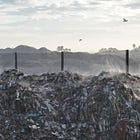The Biden Administration Just Made One of Its Most Important Climate Decisions
Biden is planning to announce a moratorium on new LNG projects. Here's why that's such a big deal.
Over the last few months, the Biden administration has been weighing up what many environmental groups have called one of the President’s biggest climate decisions. White House officials have deliberated over whether or not to approve or block the Calcasieu Pass 2 (CP2) liquified natural gas (LNG) export terminal.
The $10 billion project has been called a “carbon mega bomb.” If built, it would be the largest natural gas export facility in the country, capable of exporting 20 million tons of gas per year. The terminal would increase America’s natural gas export capacity by 20 percent.
Its approval would also set a regulatory precedent for what climate writer and activist
has called the biggest fossil fuel infrastructure buildout in the world. The decision could clear the way for dozens of other LNG projects at a time when climate scientists have said countries must stop building new fossil fuel infrastructure.Yesterday, the New York Times reported that the administration will ask the Energy Department to evaluate the climate impacts of CP2 before deciding on the project’s future. They are expected to delay their decision until after the election, effectively putting a moratorium on all new LNG projects.
The policy move, which was celebrated by climate activists and environmental groups, signals that the administration might block the massive CP2 project and about two dozen other proposed LNG projects.
As President Biden once famously said, “This is a big f—ing deal.”
To see just how big of a deal it is, let’s put the total emissions of the CP2 project and all proposed LNG projects in context.
In putting a moratorium on new LNG project approvals, the Biden administration delayed the growth of LNG exports. But they didn’t choose to stop it entirely.
Over the next year, the Energy Department will decide whether or not CP2 and similar export terminals are “in the public’s interest.”
As reported by The New York Times, “The White House is directing the Energy Department to expand its evaluation of the project to consider its impact on climate change.” It’s worth noting that when President Obama’s administration evaluated the climate impacts of the Keystone XL pipeline a decade ago, they ultimately chose to block the project.
Gas industry lobbyists will almost certainly argue that LNG isn’t a climate problem, but instead a climate solution. Michael Sabal, the CEO of Venture Global LNG—the company behind CP2—has said repeatedly that LNG is “the greatest tool the world currently possesses to combat climate change.”
He and other industry executives argue that their product replaces coal in power plants and results in less emissions globally. But this argument requires turning a blind eye to recent analyses of the full climate impact of natural gas.
LNG is responsible for carbon dioxide (CO2) and methane emissions. Looking at CO2 emissions alone, natural gas results in about half the climate impact of coal per unit of energy. This is what Sabal means when he says LNG is a tool to combat climate change. But it’s a misleading claim.
Extracting natural gas, pumping it through pipelines, and cooling it into a liquid is an imperfect process. All throughout its journey, natural gas—which is about 90% methane—leaks into the atmosphere. Over a 20-year period, one ton of methane warms the planet about 80 times faster than a ton of CO2.
Once methane leaks are factored in, LNG results in between 24 percent and 274 percent more planet-warming emissions than coal, according to a recent analysis by Robert Howarth, a professor at Cornell and leading expert on methane emissions.
It’s still unclear what analysis the Energy Department will use as it assesses the climate impact of LNG terminals like CP2. They may choose to use an analysis like Howarth’s that factors in methane leaks. Or they may listen to industry lobbyists and ignore, or downplay, methane leaks, clearing the way for LNG’s growth and billions of tons of emissions.
“Until we can halt these permits and get them to stop being approved permanently, until we can kick polluters out of our communities, the fight must continue,” Roishetta Ozane, an environmental activist and founder of the Vessel Project of Lousiana, wrote on Twitter.
Support independent climate journalism
Corporate media outlets have been laying off their climate reporters in large numbers. Meanwhile, the fossil fuel industry is ramping up lobbying and misinformation to convince people that oil and gas is good for people and the planet.
I started Distilled to produce in-depth, independent climate journalism. Thanks to our paid subscribers, I’ve been able to do original reporting, debunk climate myths, and make videos about climate change.
To support this work, please consider becoming a paid subscriber. For just $5 per month, you can make stories like this possible.








Such a great graphic!